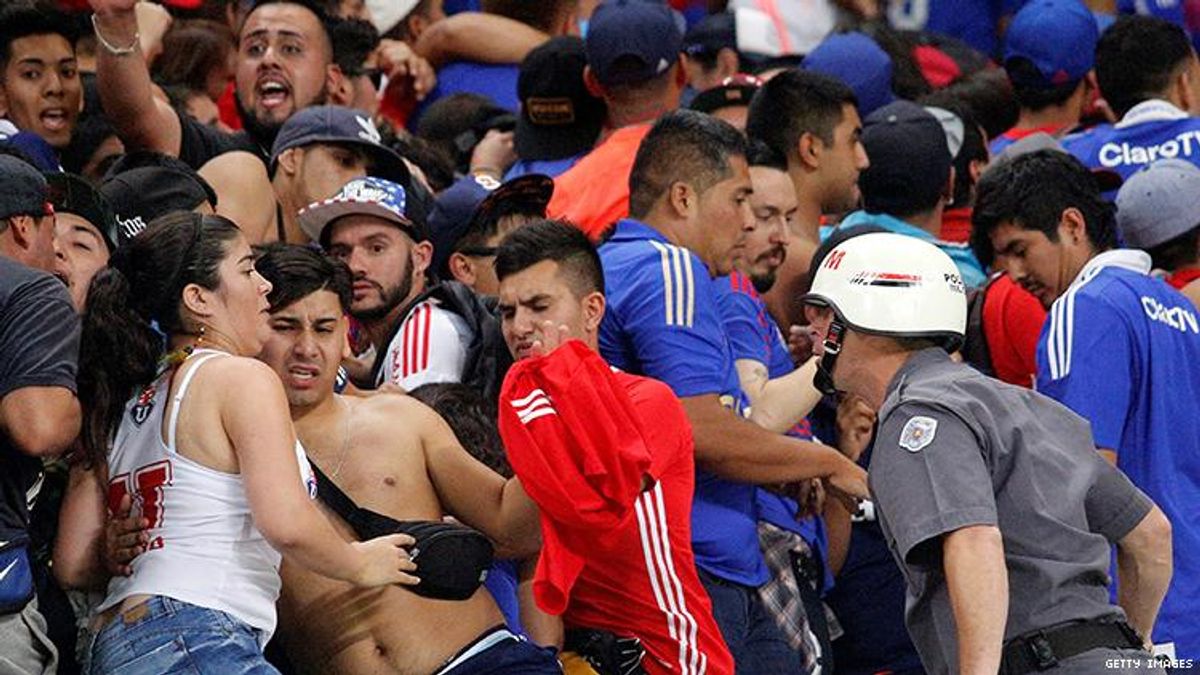I've loved soccer my entire life, but sometimes it breaks my heart. Right now, soccer fans across the world are getting ready to cheer for their favorite players during the World Cup. LGBTQ players and fans deserve to be included, too, without having to hear homophobic language that hurts and isolates us.
Growing up, I heard the "puto" chant during soccer games more times than I can count. If you're not familiar, during games in many parts of California and Mexico, when an opposing team's goalkeeper gets ready to kick, fans on the other side will yell out "puto," homophobic slang for a male sex worker. It's a part of soccer culture that many fans never even think about it, until it affects them directly.
For years, I never even thought about the chant when I heard it. As I got older and realized that I'm a lesbian, it suddenly began to feel very personal. Every time my family gathered to watch a game and I heard the chant, I felt sadness deep in my chest. It wasn't just a meaningless word -- to me, it meant that I if I told the world who I was, I wouldn't be accepted by my family at home or on the field.
And for a while, I was right, unfortunately. When I was 18, I had my first girlfriend, and my family didn't accept it. I come from a very traditional, Mexican culture where it is extremely difficult for a woman to break away from traditional norms. For years, I felt I had lost my family's love. One day, my dad told me the ugliest words, the most painful words that any daughter could hear: that I was no longer his child. That broke me completely, along with other harmful words from my brothers and my mom. Now, I know their intention was never to hurt me, but the implications of painful words and actions go a long way, no matter the intention. I fell into a major depression, filled with anxiety, paranoia, insomnia, loss of appetite, and suicidal thoughts. I reached a point where I even had a plan to end my life.
Through all of this pain, I also lost my love and passion for soccer. I left my university team and I was no longer representing the Mexican National Soccer Team. It was so hard for me to do, but without my family's love, I felt I didn't have purpose. I also struggled with constant questioning about why I liked a girl. I realized that it was simply ignorance -- that people needed to be educated about and exposed to the LGBTQ community.
Thankfully, my soccer team was pretty open and accepting. That made the process a bit easier, but I still needed my mom's love. My first nephew was born during the time I quit playing soccer, and he brought a whole new light to my world. Because of him, I had hope that love would prevail. And it did. It took every ounce of courage and fight in me to reach out to my parents and say, "I need you to love me." I told them that I was the same person they raised, and that I wasn't going to change because there is nothing wrong with loving another person. I realized that just as coming to terms with my sexuality was a process for me, it is a process for them as well. I was willing to go the extra mile to help them understand.
Eleven years later, I still struggle. I am now more courageous and proud than ever, but homophobia continues to exist. I feel this especially within my Latin culture, which is largely characterized by patriarchy and machismo. I still hear phrases like, "That's so gay," or the "puto" chant. I think people often don't realize that words they say in passing can actually damage someone's well-being. I had to speak with family about them using homophobic language. Their initial response was, "But we don't mean any harm..." and THAT is part of where the problem lies. We never know what someone may be going through. We don't know if the person sitting next to us at a soccer game is someone struggling with coming out. I am a strong, confident, openly gay woman and when I hear those words, it's devastating. Imagine if someone who is on the verge of giving up on life hears those words? We, as people, have the capacity to either make or break someone else's life.
This is why I want to urge soccer fans, when you gather to watch the World Cup and in all parts of your life, to please choose your words wisely. At the end of the day, the connections we make with others help define who we are. Choose words with love. Be defined by love.
Janelly Farias is a defender for LA Galaxy OC and the Mexico Women's National Team, and an Athlete Ally Pro Ambassador.













































































